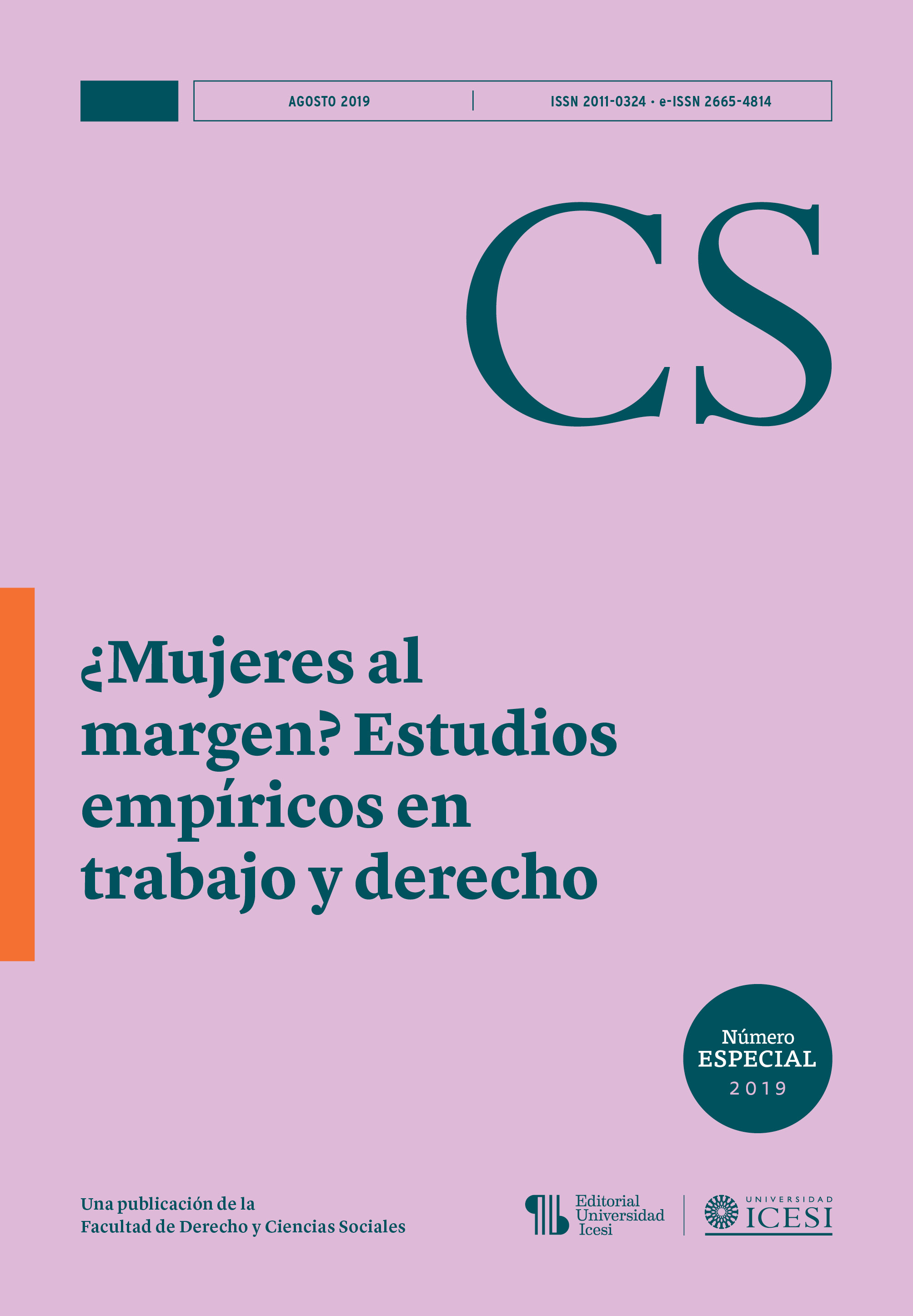Transporte, capital temporal y género
DOI:
https://doi.org/10.18046/recs.iEspecial.3236Palabras clave:
mujeres, trabajo, transporte, capital temporal, espacio-tiempoResumen
Este texto analiza cómo un grupo de mujeres trabajadoras de la ciudad de Bogotá configura unas dinámicas espacio-temporales particulares, mediante su experiencia del transporte público. La construcción de estas dinámicas se fundamenta en la concepción del tiempo como un valor, como una inversión importante que moldea el resto de los aspectos de la vida de estas mujeres. El tiempo, entonces, se asigna alrededor de
dos centros de gravedad: el trabajo y el transporte. Estos configuran nodos en el día a día de las mujeres, que son esenciales para la organización de sus vidas cotidianas. Sin embargo, el transporte es fundamental debido a su indeterminación; no es un contexto espacio-temporal de trabajo, a pesar de ser necesario para este, pero tampoco es “tiempo libre”. Esta indeterminación conduce a la pregunta por el papel del derecho laboral en estas dinámicas: si no es tiempo laboral, ni tiempo libre… ¿de quién es ese tiempo?
Descargas
Referencias
Adam, Barbara (1990). Industrial Time and Power. En Time and Social Theory (pp. 104-126). Cambridge: Polity Press. https://doi.org/Methode-701
Becker, Gary (1964). Human Capital. New York: Columbia University Press.
Becker, Gary (1965). A Theory of the Allocation of Time. The Economic Journal, 75(299), 493-517. https://doi.org/10.2307/2228949
Bento, Antonio; Cropper, Maureen; Mushfiq, Ahmed; Vinha, Katja (2003). The Impact of Urban Spatial Structure on Travel Demand in the United States. Washington, DC: The World Bank Development Research Group Infrastructure and Environment.
Collins, Hugh (1984). Ideology and Law. Marxism and Law, 1, 35-75.
Corte Europea de Justicia (2015). Sentencia de 10 de septiembre de 2015, Federación de Servicios Privados del sindicato Comisiones obreras, C-266/14, EU:C:2015:578.
De Certeau, Michel (2007). La invención de lo cotidiano. México: Universidad Iberoamericana.
Dorsch, Sebastian (2013). Space/Time Practices and the Production of Space and Time. An Introduction. Historical Social Research, 38(3), 7-21.
Duffy, Mignon (2005). Reproducing Labor Inequalities: Challenges for Feminists Conceptualizing Care at the Intersections of Gender, Race, and Class. Gender & Society, 19(1), 66-82. https://doi.org/10.1177/0891243204269499
England, Paula (2005). Emerging Theories of Care Work. Annual Review of Sociology, 31(1), 381-399. https://doi.org/10.1146/annurev.soc.31.041304.122317
Foucault, Michel (2007). El nacimiento de la biopolítica: curso en el College de France (1978-1979). Buenos Aires: FCE. https://doi.org/10.1017/CBO9781107415324.004
Giddens, Anthony (1987). Time and Social Organization. En Social Theory and Modern Sociology (pp. 140-165). Stanford: Stanford University Press.
Graham, Julie (1991). Fordism/Post-fordism, Marxism/Post-marxism: The Second Cultural Divide? Rethinking Marxism, 4(1), 39-58. https://doi.org/10.1080/08935699108657952
Johnston-Anumonwo, Ibipo (1992). The Influence of Household Type on Gender Differences in Work Trip Distance. Professional Geographer, 44(2), 161-169. https://doi.org/10.1111/j.0033-0124.1992.00161.x
Krygier, Martin (2007). Law and the State. UNSW Law Research Paper, 2007-22. https://doi.org/10.2139/ssrn.980160
Kwan, Mei-Po (2000). Gender Differences in Space-Time Constraints. Area, 32(2), 145-156. https://doi.org/10.1111/j.1475-4762.2000.tb00125.x
Lefebvre, Henri (1971). Everyday Life in the Modern World. New York: Harper Torchbooks.
Lefebvre, Henri (1991). Plan of the Present Work. En The Production of Space (pp. 1-67). Cambridge: Blackwell Publishing.
Lefebvre, Henri (2014). The Production of Space. En The People, Place and Space Reader (pp. 289-293), editado por Cindi Katz; Setha Low; Susan Saegert. New York: Routledge.
Macleod, Gordon; Ward, Kevin (2002). Spaces of Utopia and Dystopia: Landscaping the Contemporary City. Geografiska Annaler, 84(3), 153-170.
Marx, Karl (2009). El capital: crítica de la economía política. México: Siglo XXI.
Massey, Doreen (1994). Space, Place, and Gender. Saint Paul, MN: University of Minnesota Press.
McQuaid, Ronald; Chen, Tao (2012). Commuting times - The Role of Gender, Children and Part-time Work. Research in Transportation Economics, 34(1), 66-73. https://doi.org/10.1016/j.retrec.2011.12.001
Odih, Pamela (2003). Gender, Work and Organization in the Time/Space Economy of “Just-in-Time” Labour. Time and Society, 12(2-3), 293-314. https://doi.org/10.1177/0961463X030122008
Office for National Statistics (abril, 2014). Analysis of Employee Contracts that do not Guarantee a Minimum Number of Hours. Recuperado de https://britishdestinations.files.wordpress.com/2014/04/2014-ons-non-guaranteed-hour-contracts-survey-report.pdf
Pahl, Ray E. (1980). Employment, Work and the Domestic Division of Labour. International Journal of Urban & Regional Research, 4(1), 1-20.
Rappard, William (1913). Karl Marx and Labor Legislation. Quarterly Journal of Economics, 27(3), 530-536.
Roberts, Jennifer; Hodgson, Robert; Dolan, Paul (2009). It’s Driving her Mad: Gender Differences in the Effects of Commuting on Psychological Well-being. Sheffield Economic Research Paper Series, 2009009.
Scraton, Sheila; Watson, Beccy (1998). Gendered Cities: Women and Public Leisure Space in the ‘Postmodern City’. Leisure Studies, 17(2), 123-137. https://doi.org/10.1080/026143698375196
Stutzer, Alois; Frey, Bruno (2008). Stress that Doesn’t Pay: The Commuting Paradox. Scandinavian Journal of Economics, 110(2), 339-366. https://doi.org/10.1111/j.1467-9442.2008.00542.x
Thompson, Edward (1967). Time, Work-discipline, and Industrial Capitalism. Past & Present, 38, 56-97.
Tuckman, Alan (2005). Employment Struggles and the Commodification of Time: Marx and the Analysis of Working Time Flexibility. Philosophy of Management, 5(11), 47-56.
Vincent, Andrew (1993). Marx and Law. Journal of Law and Society, 20(4), 371-397. https://doi.org/10.2307/1410207
Publicado
Número
Sección
Licencia
Derechos de autor 2019 Daniela Palacio-Rodríguez, Juan M. Amaya-Castro, PhD

Esta obra está bajo una licencia internacional Creative Commons Atribución-NoComercial 4.0.
© Derechos reservados de autor
El material de esta publicación puede ser reproducido sin autorización, siempre y cuando se cite el título, autor y fuente institucional.











